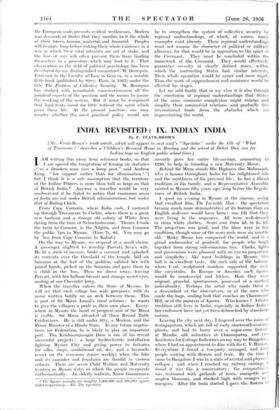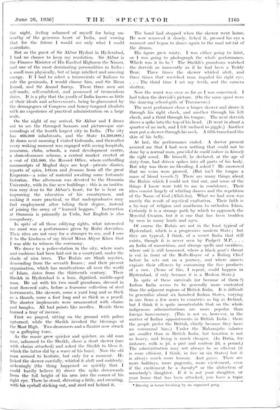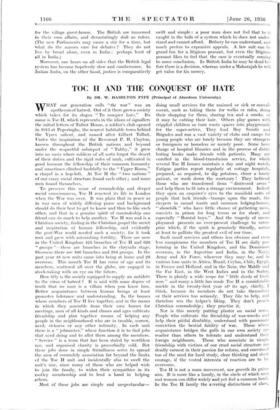INDIA REVISITED : IX. INDIAN INDIA
By F. YEATS-BROWN
[Mr. Fads-Brown's tenth article, which will appear in next week's "Spectator" under the title of What qf Tomorrow ?" describes a Children's Remand Home in Bombay and the school at Dehra Dun run for Indian boys on English public school lines.] IAM writing this away from reference books, so that I am spared the temptation of leaning on statistics (" as a drunken man uses a lamp post," said Andrew Lang, " for support rather than for illumination ! ") but I think it is a safe assumption that the territory of the Indian Princes is more than half as large as that of British India.* Anyway a traveller would be very unobservant if he failed to notice that enormous areas of India are not under British administration, but under that of Ruling Chiefs.
From Cape Comorin, where India ends, I motored up through Travancore to Cochin, where there is a great new harbour and a strange old colony of White Jews dating from the time of Nebuchadnezzar. Thence I took the train to Coonoor, in the Nilgiris, and from Coonoor the public 'bus to Mysore. (Fare 7s. 6d. You may go by -'bus from Cape Comorin to Kabul.) On the way to Mysore, we stopped at a small shrine. A passenger alighted to worship Parvati, Siva's wife. He lit a stick of incense, broke a coconut and splashed its contents over the threshold of the temple, laid six bananas at the feet of the goddess, saluted her with joined hands, picked up the bananas and gave them to a child in the 'bus. Then we drove away, leaving Parvati, with her balloon-breasts and strange secret eyes, smiling at our Chevrolet lorry.
When the traveller enters the State of Mysore, he will see that each village has wide gateposts, with its name written boldly on an arch between them. This is part of Sir Mirza Ismail's rural reforms : he wants to give the villagers a pride in their own place. Every- where in Mysore the hand of progress and of Sir Mirza is visible. Sir Mirza attended all three Round Table Conferences. He is still under fifty, a Moslem, and the Prime Minister of a Hindu State. In any future negotia- tions for Federation, he is likely to play an important part. The Krishnarajasagar Dam is one of his recent successful projects : a huge hydroelectric installation fighting Mysore City and giving power to factories for silks, soaps, sandalwood oil, &c., and a favourite resort on the occasions (twice weekly) when the lake and its cascades and fountains are floodlit in various colours. There are seven Child Welfare and Maternity Centres in Mysore City, in which the people co-operate enthusiastically. An elderly midwife, Nurse Gnanamma, * The figures actually are roughly 1,300,000 and 500,000 square miles respectively.—En. The Spectator. recently gave her entire life-savings, amounting to 1230, to help in founding a new Maternity Home.
Behind Sir Mirza stands His Highness the Maharajah, who is known throughout India for his enlightened rule and the saintliness of his personal life : he has a liberal tradition in his family, and a Representative Assembly existed in Mysore fifty years ago, long before the Legisla- tures of British India.
I spent an evening in Mysore at the cinema, seeing that excellent film, The Invisible Man : the spectators became much more demonstrative at its horrors than an English audience would have been : one felt that they were living in the sequences. All were well-dressed in clean white clothes. Seats cost from 4d. to 2s. 8(1. The projection was good, and the films were in fair condition, though some of the news-reels were six months old. Micky Mouse has conquered the world, and is a grand ambassador of goodwill, for people who . laugh together form strong sub-conscious ties. Clocks, lights and proscenium were planned with an eye to proportion and simplicity ; like most buildings in Mysore, this hall is in excellent taste. On each side of the balcony where I sat, sculptured maidens supported the roof, like caryatides. In Europe or America such figures would be nondescript and lifeless. Here they were original, graceful, spontaneous, possessed of a marked individuality. Perhaps the artist who made them is a descendant of the idol-carvers, or of the men who made the huge, smiling bull that couches on Chaumundi Hill, or of the painters of Ajanta. Who knows ? Artistic tradition still lives in India, especially in Indian India : her craftsmen have not yet been debauched by standard- isation.
Leaving the city next day, I lingered over the ruins of Seringapatam, which are full of early nineteenth-century ghosts, and had to hurry over a sugar-cane factory at Mandia, silk industries at Channapatna, and two Institutes for Cottage Industries on my way to Bangalore, where I had an appointment to dine with Sir C. V. Raman. Everywhere I found a tea-party arranged, and kind people waiting with flowers and fruit. By the time I came to Bangalore I was in a state of mental and physical collapse ; and when I reached my railway carriage, I found it was like a conservatory : the compartment, was festooned with garlands of roses, marigolds and moghra blossoms, and stacked high with oranges awl mangoes. After the train started I gave the flowers to the night, feeling ashamed • of myself for being un- worthy of the generous heart of India, and vowing that for the future I would see only what I could assimilate.
But as the guest of Sir Akbar Hydari in Hyderabad, I had no chance to keep my resolution. Sir Akbar is the Finance Minister of His Exalted Highness the Nizam, and one of the most dominating personalities in India.: a small man physically, but of large intellect and amazing energy. If I had to select a triumvirate of Indians to rule the peninsula, I would choose him, and - Sir Mirza Ismail, and Sir Anand Sarup. These three men are self-made, self-confident, and possessed of tremendous drive. It is a pity that the youth of India knows so little of their ideals and achievements, being be-glamoured by the demagogues of Congress and honey-tongued idealists with no experience of practical administration on a large scale.
On the night of my arrival, Sir Akbar and I drove out to see the thronged bazaars and picturesque sur- roundings of the fourth largest city in India. (The city has 466,000 inhabitants, and the State 14,500,000.) At dawn next morning I visited Golconda, and thereafter every waking moment was engaged with seeing hospitals, museums, clubs, schools, a rural development centre, a slum-clearance scheme, a central market erected at a cost of £35,000, the- Record Office, where enthralling manuscripts of Moghul days are kept—private diaries, reports of spies, letters and firmans from all the great Emperors—a mine of material awaiting some fortunate historian. One afternoon was devoted to the Osmania University, with its fine new buildings : this is an institu- tion -very dear to Sir Akbar's heart, for he is bent on improving the education of his countryMen, and making it more practical, so that undergraduates may find employment after taking their degree, instead of joining the army of " learned beggars." Instruction at Osmania is primarily in Urdu, but English is also compulsory.
In spite of all these edifying sights, what interested me most was a performance given by Rufai dervishes. Their rites are not easy for a stranger to see, and I owe it to the kindness of my friend Mirza Aliyar Khan that I was able to witness the ceremony.
We drove to a police-station in the city, where mats and cushions had been-laid out in a courtyard, under the shade of nim trees. The Rufais are Shiah mystics, descending from the seventh Imam ; and their present organisation, which has ramifications all over the world -of Islam, dates from the thirteenth century. Their -Sheikh in Hyderabad is a lean, dignified, middle-aged man. He sat with his two small grandsons, dressed in neat flowered suits, before a• fearsome collection of steel instruments, like skewers, some a yard long and as thick as-a thumb, some a foot long and as thick as a pencil. The shorter implements were ornamented with chains and bangles. All had points like needles. Beside them burned a tray of incense.
First we prayed, sitting on the ground with palms upturned; while the Sheikh invoked the blessings of the Most High. - Two drummers and a flautist now struck up a galloping-tune.
As the music' greW quicker- and quicker, an- old man rose, salaamed to the Sheikh, chose -a short skewer (one with -chains attached) and asked the Sheikh to bless it, whichthe latter did by a wave of his hand. Now the old man seemed to hesitate, but only for a moment. -He licked the skewer carefully, whirled it a-loft and suddenly, sickeningly (the thing happened so quickly that I could hardly believe it) drove the spike downwards from the• full height of his arm into the corner of his right eye. There he stood, shivering a little, and sweating, with his eyeball sticking out,- and. steel rod behind it: The band had stopped when the skewer went' home. He now removed it -slowly, licked it, pressed his eye a moment and began to dance again to the mad rat-tat of the drums.
His figure grew misty. I was either going to faint, or I was going to photograph the whole performance.
Which was it to be ? The Sheikh's grandsons watched the dervish as innocently as if he had been a Teddy Bear. Three times the skewer whirled aloft, and three times that wretched man impaled his right eye. . . . The third time I set my teeth, and the camera shutter.
Now the worst was over as far as I was concerned. I had taken the dervish's picture. (On the same spool were the dancing school-girls of Travancore.) The next performer chose a longer skewer and drove it through his right cheek, and another through his left cheek, and a third through his tongue. The next dervish drove a spike into the top of his head. (It went in about a quarter of an inch, and I felt inclined to giggle.) Another man put a skewer through his-neck. A fifth transfixed the skin of his belly.
At last, the performance ended. - A doctor present .assured me that I had seen nothing that could not be done by a normal man, provided he could induce in himself the right mood. He himself, he declared, at the age of sixty-four, had driven spikes into all parts of his body. But why was there no bleeding, I asked ? He answered that no veins were pierced. (But isn't the tongue a mass of blood vessels ?) There are many things about the Rufais which I could not find out, and some of the things I know were told to me in confidence. Their rites consist largely of whirling dances and the repetition of the Name of God (Allah-hu).. What we had seen was merely the result of mystical exaltation. Their faith is a by-way of religion and anathema to orthodox Islam. Certainly it is a strange path by which to approach the Merciful Creator, but it is one that has been trodden by men in many lands and ages.
Of course the Rufais are not in the least typical of Hyderabad, which is a progressive modern State ; but they are typical, I think, of a secret India that still exists, though it is never seen by Padgett M.P. . . . an India of masochism, and strange spells and sacrifices, where sati is still honoured, where a black goat's throat is cut in front of the Rolls-Royce of a Ruling Chief before he sets out on a journey, and where sinners expiate their offences by consuming the five products of a cow. (None of this, I repeat, could happen in Hyderabad, if only because it is a Moslem State.) In spite of these survivals (or because of them ?) Indian India seems to be generally more • contented than the adjacent regions of British India. It is difficult to generalise about six hundred Indian States, varying in size from a few acres to countries as big as Ireland, but . I think it is quite incontestable that on the whole indigenous administrations are more popular than foreign bureaucracy. (This is not so, however, in the matter of Indian appointments in British India : there the people prefer the British, chiefly because they have no communal. bias.) Under the Maharajahs salaries are smaller than in British India, but taxation is not so heavy, and living is much cheaper. (In Datia, for instance, milk is a pint and mutton 2d, a pound.) The administration may not always be so efficient (it is more efficient, I think, in five or six States) but it is always much , more human. And gayer. There are more holidays, more pageants, more excitement, even if the excitement -be a dacoity*: or the abduction of somebody's daughter.. If it is not your daughter, or your home that has been attacked, you have a topic
*Dacoity is house-breaking by an organised gang.
for the village guest-house. The British are immersed in their own affairs, and devastatingly dull as rulers. (The new Parliaments may cause a stir for a time, but what do the masses care for debates ? They do not live by bread alone, even in India : perhaps least of all in India.) Moreover, one hears on all sides that the British legal system has become hopelessly slow and cumbersome. In Indian India, on the other hand, justice is comparatively swift and simple : a poor man does not feel that he is caught in the toils of a system which he does not under- stand and cannot afford. Bribery he can understand, and much prefers to expensive appeals. A• law suit can be grand fun for a litigious peasant, but even the litigious peasant likes to feel that the case is eventually coming to some conclusion. In British India he may be dead be- fore there is a decision, whereas under a Maharajah he will get value for his money.












































 Previous page
Previous page